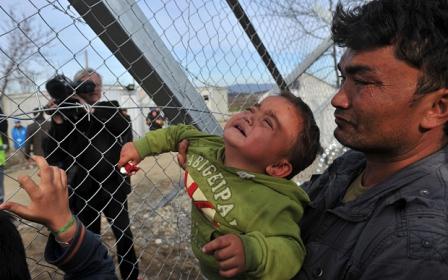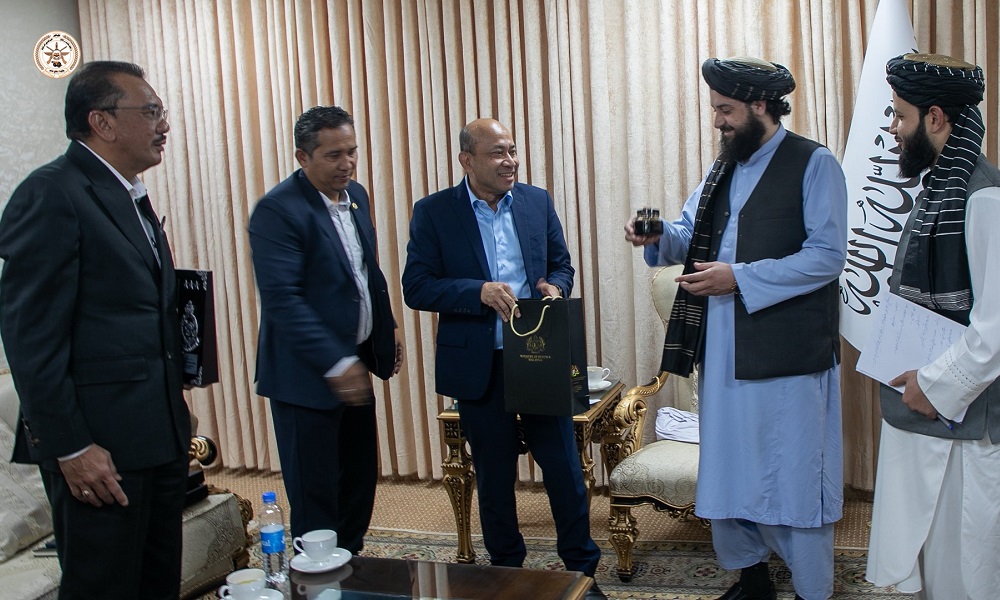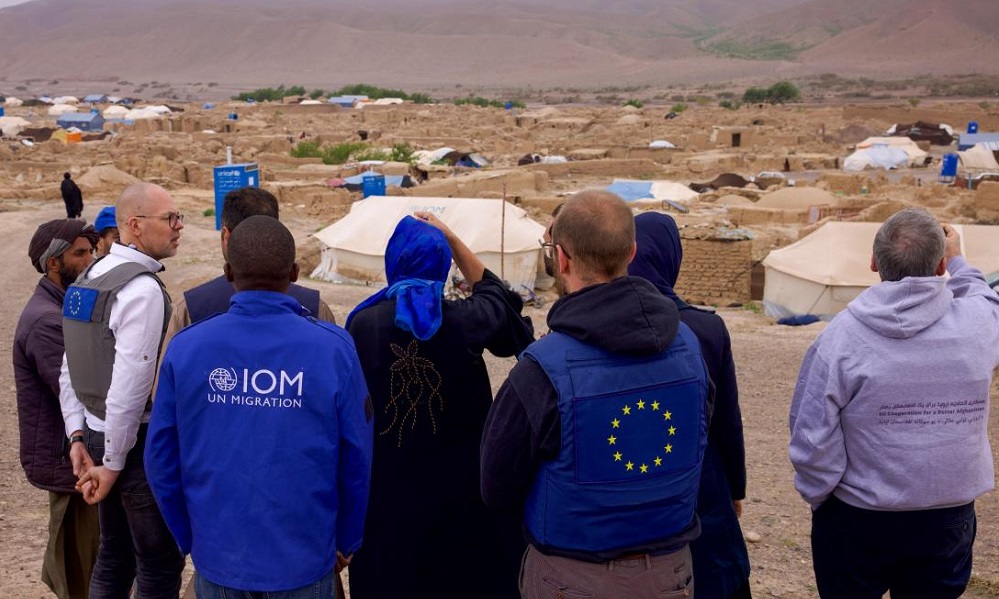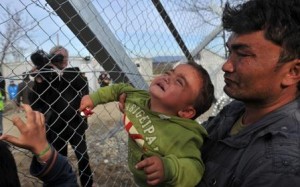Latest News
EU seeks to deport 80,000 Afghan refugees

More than 80,000 Afghans will need to be deported from Europe “in the near future” under a secret EU plan, amid warnings of a new influx as parts of the country fall back under Taliban control.
The European Commission should threaten to reduce aid that provides 40 per cent of Afghanistan’s GDP unless the “difficult” Kabul government agrees to the mass removal of tens of thousands of failed asylum migrants, a leaked document suggests. It admits the threat, if carried through, could result in the collapse of the fragile state.
The Afghan elite will be rewarded with university places in Europe, under a new EU strategy to use aid and trade as “incentives” to secure deportation agreements for economic migrants from “safe” areas of Afghanistan.
The plan is revealed in a joint “non-paper” discussion document, marked EU Restricted, which was prepared by the European Commission and its foreign policy arm, the External Action Service, and sent to national ambassadors on March 3.
Record violence amid a Taliban insurgency, with 11,000 civilian casualties last year, and economic failure means there is a “high risk of further migratory flows to Europe,” it warns. There are 1.1 million internally displaced Afghans and 5.4 million sheltering in Pakistan and Iran, whose situation is “precarious without reliable long-term perspectives.”
In October, the European Union is hosting an international donor summit for Afghanistan, with the intention of raising enough aid for the period 2017-20 to keep flows at their current levels.
Jean-Claude Juncker’s officials propose using the summit as “leverage” to secure a deportation deal, noting that the EU has pledged more to Afghanistan than any other country with €1.4 billion earmarked until 2020.
“The EU should stress that to reach the objective of the Brussels Conference to raise financial commitments ‘at or near current levels’ it is critical that substantial progress has been made in the negotiations with the Afghan Government on migration by early summer, giving the member states and other donors the confidence that Afghanistan is a reliable partner able to deliver,” it says.
Under a section entitled “Afghan interests,” it says President Ghani’s government is “highly aid dependent”. “Without the continued high levels of international transfers… [it] is unlikely to prevail, as it is being faced by multiple security, economic and political challenges”.
Some 176,000 Afghans claimed asylum in the EU last year, with around six in ten eligible, a rate that has risen as the security situation deteriorates. They make up a quarter of refugees landing in Greece.
The paper, which was obtained by the Statewatch civil liberties website, says the EU’s co-operation with Afghanistan so far has been “difficult and uneven”. Despite President Ghani’s public statements, “other members of the Government do not appear to facilitate the return of irregular migrants, while attempting to re-negotiate conditions to restrict the acceptance of returnees.”
In exchange for accepting “forced returns” of economic migrants from designated “safe areas” of the country, European universities could offer places to Afghan students and researchers under the Erasmus+ scholarship scheme, the paper says, under a section entitled: “Possible components of EU incentives package”.
The document cautions, however, that “the risk that those students apply for asylum once in the EU and make their outmost not to return is however very high, as demonstrated by several cases recently.”
The CAPD development deal, which commits the EU to help in rural development, health, education and counter-drugs programs for a decade, could also be used as a bargaining chip to get a deportation agreement, the document says.
The EU will also provide training and healthcare to those who are deported.
It admits that identifying the safe areas of Afghanistan when processing asylum claims is “not obvious, given the rising insecurity in many provinces”.
The plan also suggests using the laissez passer, a legally controversial deporting document issued by the EU to migrants who have lost or destroyed their own papers.
The EU has publicly embraced a strategy of chequebook diplomacy as it struggles to contain the biggest migrant crisis since 1945.
The proposed deal appears similar to a gambit rejected by African leaders in Malta last year, in which the EU offered €1.8 billion in aid , university places and looser conditions for holders of diplomatic passports in exchange for accepting the forcible deportation of hundreds of thousands of African economic migrants. In the end, leaders settled on a voluntary scheme of returns.
It follows a controversial deal on Friday with Turkey, which was awarded €6 billion and visa liberalisation in exchange for the near-automatic return of all asylum seekers reaching the Greek islands.
Earlier this month Theresa May won a Court of Appeal case to resume deportations to Afghanistan under a separate arrangement. Judges ruled that while several provinces are dangerous, Kabul is safe enough for returns.
Germany, a major destination for Afghan migrants, is pushing hard for its own deportation agreement.
Source: Telegraph

Latest News
Tripartite trade meeting held in Kabul to boost regional connectivity

A tripartite meeting between the delegations of Afghanistan, Turkmenistan and Kazakhstan was held in Kabul with the aim of connecting North Asia to South Asia and reducing transit and transportation costs among these three countries, the Ministry of Trade and Commerce said in a statement.
In this meeting, an agreement was reached on the creation of a joint technical committee to continue the talks.
This tripartite meeting was held under the leadership of Nooruddin Azizi, the Acting Minister of Industry and Commerce, Vice President of Turkmenistan and Srik Zhumangarin, the Deputy Prime Minister of Kazakhstan.
Earlier, a bilateral meeting was held between the delegation of the Islamic Emirate and Turkmenistan. The ministry of commerce said the participants of the meeting discussed the construction of a large joint logistics center in Torghondi, the trilateral transit agreement between the IEA, Turkmenistan, and Kazakhstan, the expansion of Afghanistan’s railway, solving issues related to Afghan transit and export goods, and a number of other commercial issues.
Latest News
No destructive groups including Daesh present in Afghanistan: Yaqub Mujahid

Acting Minister of National Defense Mohammad Yaqub Mujahid has said that no destructive groups including Daesh have physical presence in Afghanistan, adding the Islamic Emirate of Afghanistan (IEA) will not allow anyone to pose threat to any country in the region from the Afghan soil.
Mujahid made the remarks in a meeting with a delegation from Malaysia in Kabul on Thursday.
According to a statement released by the Ministry of Defense, Mujahid highlighted Malaysia’s “good treatment” of Afghan refugees and its long-standing relations with Afghanistan, and said that Malaysia is a powerful Islamic country and visits should increase.
He added that with the establishment of the Islamic Emirate, occupation and war ended in Afghanistan, and the country is fully secure.
Based on the statement, the Malaysian delegation called Afghanistan a friendly country and while emphasizing on comprehensive cooperation, it assured that what they have seen in Afghanistan will be shared with the authorities of their country.
Latest News
EU allocates 17 million euros to support Afghans on the move

The European Union signed an agreement worth 17 million euros with the International Organization for Migration (IOM) to improve access to basic services, increased economic opportunities and protection for Afghans on the move and their host communities in Afghanistan.
The needs of women and girls are a particular focus of the programme, EU said in a statement released on Thursday.
The statement noted that from January 2023 until April 2024, over 1.5 million Afghans returned from Pakistan and Iran.
“I am deeply moved by the hardship returnees face when being deported to Afghanistan. In a country suffering from poverty and climate change, and in a city that just saw devastating earthquakes, this truly is a crisis within a crisis.”, said Peteris Ustubs, Director for the Middle East, Asia and Pacific of the European Commission’s Department for International Partnerships during the signing ceremony at the IOM transit centre in Herat.
Raffaella Iodice, EU Chargée d’Affaires a.i. to Afghanistan, added “The solidarity of the Afghan people towards their brothers and sisters is an inspiration. We must assure that communities hosting and helping new arrivals are supported. The partnership with IOM ensures access to essential services and provides protection for Afghan returnees and their host communities. As women and girls can be particularly affected, we make sure that all members of society can benefit”.
“IOM’s continued partnership with the EU has been critical in enabling our teams to reach hundreds of thousands of Afghan returnees and other vulnerable communities in the country”, said IOM Afghanistan Chief of Mission, Maria Moita. “Thanks to this renewed commitment, we will be able to focus on addressing the immense challenges in the areas of return and contribute to reintegration, social cohesion, and longer-term solutions for those communities.”
This additional contribution is part of a 5-year programme that is being implemented across Afghanistan and in four countries in the region. It builds on the EU’s previous support to IOM to improve the wellbeing of Afghans forced to return to the country, EU said.
-

 Latest News4 days ago
Latest News4 days agoRashid Khan named AWCC’s brand ambassador
-

 Regional4 days ago
Regional4 days agoIranian president lands in Pakistan for three-day visit to mend ties
-

 Sport4 days ago
Sport4 days agoKolkata beat Bengaluru by one run in IPL as Kohli fumes at dismissal
-

 Sport5 days ago
Sport5 days agoACL: Aino Mina 3-0 Istiqlal Kabul; Attack Energy 3-0 Khadim
-

 Climate Change5 days ago
Climate Change5 days agoRescuers race to reach those trapped by floods in China’s Guangdong
-

 World4 days ago
World4 days agoMalaysian navy helicopters collide in mid-air, 10 killed
-

 Sport3 days ago
Sport3 days agoJaiswal ton powers Rajasthan to big IPL win
-

 World3 days ago
World3 days agoNorth Korea officials visit Iran in a rare public trip
















